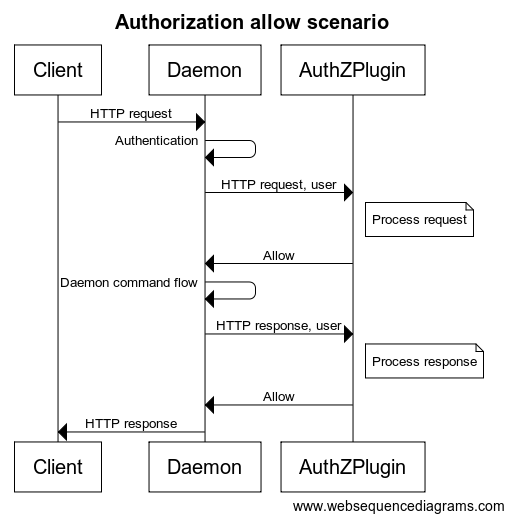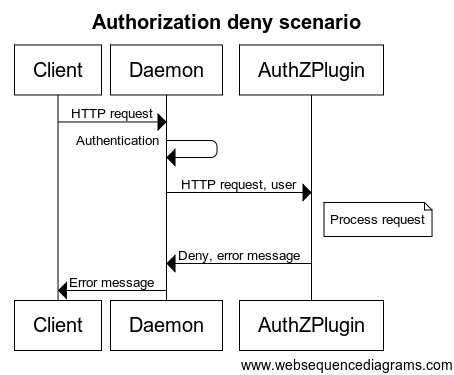github.com/hustcat/docker@v1.3.3-0.20160314103604-901c67a8eeab/docs/extend/plugins_authorization.md (about) 1 <!--[metadata]> 2 +++ 3 title = "Access authorization plugin" 4 description = "How to create authorization plugins to manage access control to your Docker daemon." 5 keywords = ["security, authorization, authentication, docker, documentation, plugin, extend"] 6 aliases = ["/engine/extend/authorization/"] 7 [menu.main] 8 parent = "engine_extend" 9 weight = -1 10 +++ 11 <![end-metadata]--> 12 13 14 # Create an authorization plugin 15 16 Docker's out-of-the-box authorization model is all or nothing. Any user with 17 permission to access the Docker daemon can run any Docker client command. The 18 same is true for callers using Docker's remote API to contact the daemon. If you 19 require greater access control, you can create authorization plugins and add 20 them to your Docker daemon configuration. Using an authorization plugin, a 21 Docker administrator can configure granular access policies for managing access 22 to Docker daemon. 23 24 Anyone with the appropriate skills can develop an authorization plugin. These 25 skills, at their most basic, are knowledge of Docker, understanding of REST, and 26 sound programming knowledge. This document describes the architecture, state, 27 and methods information available to an authorization plugin developer. 28 29 ## Basic principles 30 31 Docker's [plugin infrastructure](plugin_api.md) enables 32 extending Docker by loading, removing and communicating with 33 third-party components using a generic API. The access authorization subsystem 34 was built using this mechanism. 35 36 Using this subsystem, you don't need to rebuild the Docker daemon to add an 37 authorization plugin. You can add a plugin to an installed Docker daemon. You do 38 need to restart the Docker daemon to add a new plugin. 39 40 An authorization plugin approves or denies requests to the Docker daemon based 41 on both the current authentication context and the command context. The 42 authentication context contains all user details and the authentication method. 43 The command context contains all the relevant request data. 44 45 Authorization plugins must follow the rules described in [Docker Plugin API](plugin_api.md). 46 Each plugin must reside within directories described under the 47 [Plugin discovery](plugin_api.md#plugin-discovery) section. 48 49 **Note**: the abbreviations `AuthZ` and `AuthN` mean authorization and authentication 50 respectively. 51 52 ## Basic architecture 53 54 You are responsible for registering your plugin as part of the Docker daemon 55 startup. You can install multiple plugins and chain them together. This chain 56 can be ordered. Each request to the daemon passes in order through the chain. 57 Only when all the plugins grant access to the resource, is the access granted. 58 59 When an HTTP request is made to the Docker daemon through the CLI or via the 60 remote API, the authentication subsystem passes the request to the installed 61 authentication plugin(s). The request contains the user (caller) and command 62 context. The plugin is responsible for deciding whether to allow or deny the 63 request. 64 65 The sequence diagrams below depict an allow and deny authorization flow: 66 67  68 69  70 71 Each request sent to the plugin includes the authenticated user, the HTTP 72 headers, and the request/response body. Only the user name and the 73 authentication method used are passed to the plugin. Most importantly, no user 74 credentials or tokens are passed. Finally, not all request/response bodies 75 are sent to the authorization plugin. Only those request/response bodies where 76 the `Content-Type` is either `text/*` or `application/json` are sent. 77 78 For commands that can potentially hijack the HTTP connection (`HTTP 79 Upgrade`), such as `exec`, the authorization plugin is only called for the 80 initial HTTP requests. Once the plugin approves the command, authorization is 81 not applied to the rest of the flow. Specifically, the streaming data is not 82 passed to the authorization plugins. For commands that return chunked HTTP 83 response, such as `logs` and `events`, only the HTTP request is sent to the 84 authorization plugins. 85 86 During request/response processing, some authorization flows might 87 need to do additional queries to the Docker daemon. To complete such flows, 88 plugins can call the daemon API similar to a regular user. To enable these 89 additional queries, the plugin must provide the means for an administrator to 90 configure proper authentication and security policies. 91 92 ## Docker client flows 93 94 To enable and configure the authorization plugin, the plugin developer must 95 support the Docker client interactions detailed in this section. 96 97 ### Setting up Docker daemon 98 99 Enable the authorization plugin with a dedicated command line flag in the 100 `--authorization-plugin=PLUGIN_ID` format. The flag supplies a `PLUGIN_ID` 101 value. This value can be the plugin’s socket or a path to a specification file. 102 103 ```bash 104 $ docker daemon --authorization-plugin=plugin1 --authorization-plugin=plugin2,... 105 ``` 106 107 Docker's authorization subsystem supports multiple `--authorization-plugin` parameters. 108 109 ### Calling authorized command (allow) 110 111 ```bash 112 $ docker pull centos 113 ... 114 f1b10cd84249: Pull complete 115 ... 116 ``` 117 118 ### Calling unauthorized command (deny) 119 120 ```bash 121 $ docker pull centos 122 ... 123 docker: Error response from daemon: authorization denied by plugin PLUGIN_NAME: volumes are not allowed. 124 ``` 125 126 ### Error from plugins 127 128 ```bash 129 $ docker pull centos 130 ... 131 docker: Error response from daemon: plugin PLUGIN_NAME failed with error: AuthZPlugin.AuthZReq: Cannot connect to the Docker daemon. Is the docker daemon running on this host?. 132 ``` 133 134 ## API schema and implementation 135 136 In addition to Docker's standard plugin registration method, each plugin 137 should implement the following two methods: 138 139 * `/AuthzPlugin.AuthZReq` This authorize request method is called before the Docker daemon processes the client request. 140 141 * `/AuthzPlugin.AuthZRes` This authorize response method is called before the response is returned from Docker daemon to the client. 142 143 #### /AuthzPlugin.AuthZReq 144 145 **Request**: 146 147 ```json 148 { 149 "User": "The user identification", 150 "UserAuthNMethod": "The authentication method used", 151 "RequestMethod": "The HTTP method", 152 "RequestUri": "The HTTP request URI", 153 "RequestBody": "Byte array containing the raw HTTP request body", 154 "RequestHeader": "Byte array containing the raw HTTP request header as a map[string][]string ", 155 "RequestStatusCode": "Request status code" 156 } 157 ``` 158 159 **Response**: 160 161 ```json 162 { 163 "Allow": "Determined whether the user is allowed or not", 164 "Msg": "The authorization message", 165 "Err": "The error message if things go wrong" 166 } 167 ``` 168 #### /AuthzPlugin.AuthZRes 169 170 **Request**: 171 172 ```json 173 { 174 "User": "The user identification", 175 "UserAuthNMethod": "The authentication method used", 176 "RequestMethod": "The HTTP method", 177 "RequestUri": "The HTTP request URI", 178 "RequestBody": "Byte array containing the raw HTTP request body", 179 "RequestHeader": "Byte array containing the raw HTTP request header as a map[string][]string", 180 "RequestStatusCode": "Request status code", 181 "ResponseBody": "Byte array containing the raw HTTP response body", 182 "ResponseHeader": "Byte array containing the raw HTTP response header as a map[string][]string", 183 "ResponseStatusCode":"Response status code" 184 } 185 ``` 186 187 **Response**: 188 189 ```json 190 { 191 "Allow": "Determined whether the user is allowed or not", 192 "Msg": "The authorization message", 193 "Err": "The error message if things go wrong", 194 "ModifiedBody": "Byte array containing a modified body of the raw HTTP body (or nil if no changes required)", 195 "ModifiedHeader": "Byte array containing a modified header of the HTTP response (or nil if no changes required)", 196 "ModifiedStatusCode": "int containing the modified version of the status code (or 0 if not change is required)" 197 } 198 ``` 199 200 The modified response enables the authorization plugin to manipulate the content 201 of the HTTP response. In case of more than one plugin, each subsequent plugin 202 receives a response (optionally) modified by a previous plugin. 203 204 ### Request authorization 205 206 Each plugin must support two request authorization messages formats, one from the daemon to the plugin and then from the plugin to the daemon. The tables below detail the content expected in each message. 207 208 #### Daemon -> Plugin 209 210 Name | Type | Description 211 -----------------------|-------------------|------------------------------------------------------- 212 User | string | The user identification 213 Authentication method | string | The authentication method used 214 Request method | enum | The HTTP method (GET/DELETE/POST) 215 Request URI | string | The HTTP request URI including API version (e.g., v.1.17/containers/json) 216 Request headers | map[string]string | Request headers as key value pairs (without the authorization header) 217 Request body | []byte | Raw request body 218 219 220 #### Plugin -> Daemon 221 222 Name | Type | Description 223 --------|--------|---------------------------------------------------------------------------------- 224 Allow | bool | Boolean value indicating whether the request is allowed or denied 225 Msg | string | Authorization message (will be returned to the client in case the access is denied) 226 Err | string | Error message (will be returned to the client in case the plugin encounter an error. The string value supplied may appear in logs, so should not include confidential information) 227 228 ### Response authorization 229 230 The plugin must support two authorization messages formats, one from the daemon to the plugin and then from the plugin to the daemon. The tables below detail the content expected in each message. 231 232 #### Daemon -> Plugin 233 234 235 Name | Type | Description 236 ----------------------- |------------------ |---------------------------------------------------- 237 User | string | The user identification 238 Authentication method | string | The authentication method used 239 Request method | string | The HTTP method (GET/DELETE/POST) 240 Request URI | string | The HTTP request URI including API version (e.g., v.1.17/containers/json) 241 Request headers | map[string]string | Request headers as key value pairs (without the authorization header) 242 Request body | []byte | Raw request body 243 Response status code | int | Status code from the docker daemon 244 Response headers | map[string]string | Response headers as key value pairs 245 Response body | []byte | Raw docker daemon response body 246 247 248 #### Plugin -> Daemon 249 250 Name | Type | Description 251 --------|--------|---------------------------------------------------------------------------------- 252 Allow | bool | Boolean value indicating whether the response is allowed or denied 253 Msg | string | Authorization message (will be returned to the client in case the access is denied) 254 Err | string | Error message (will be returned to the client in case the plugin encounter an error. The string value supplied may appear in logs, so should not include confidential information)